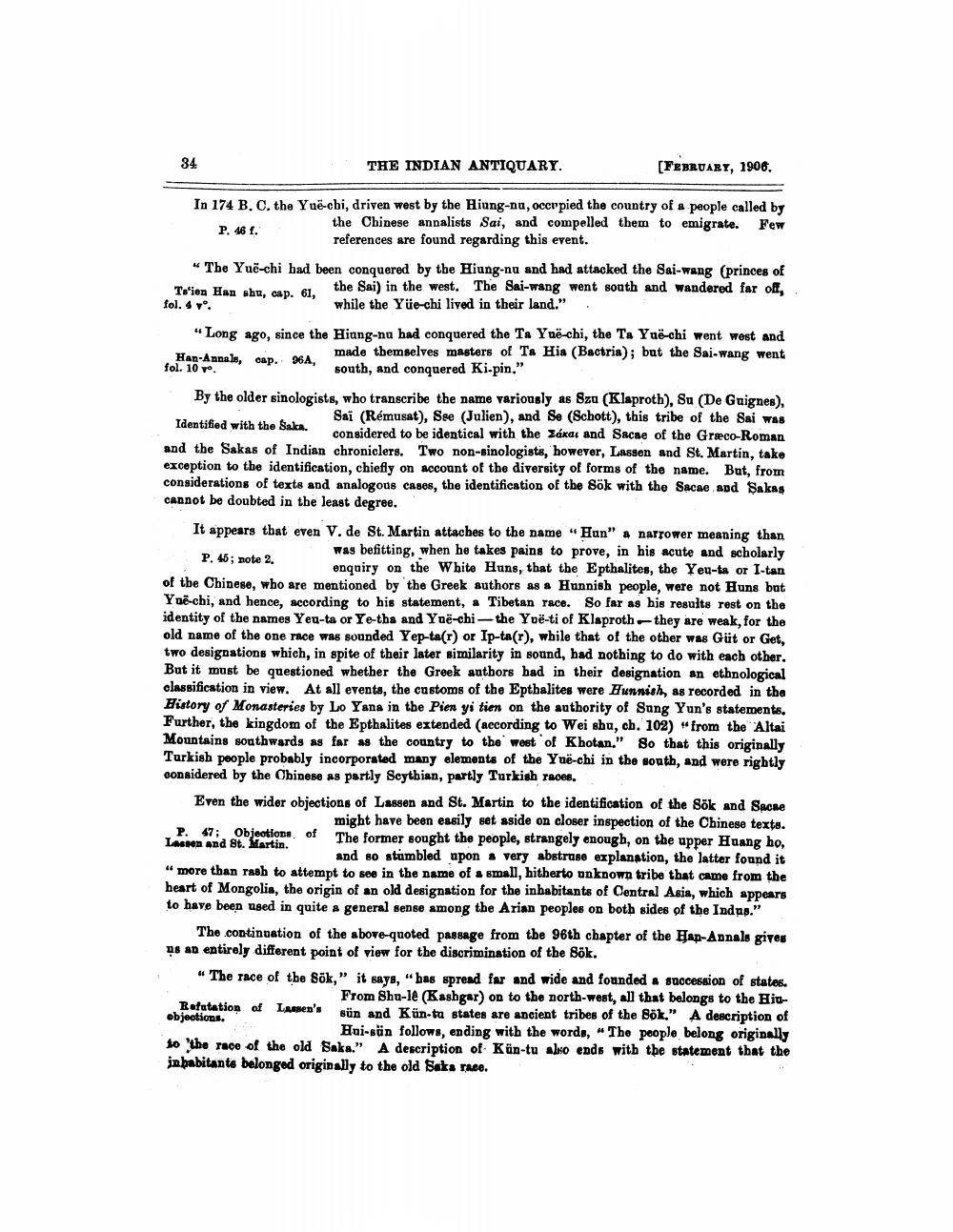________________
THE INDIAN ANTIQUARY.
(FEBRUARY, 1906.
In 174 B. O, the Yue-chi, driven west by the Hiung-nu, occr pied the country of a people called by
the Chinese annalists Sai, and compelled them to emigrate. Few P. 46 f.
references are found regarding this event.
“The Yue-chi had been conquered by the Hiung-nu and had attacked the Sai-wang (princes of To'ien Han shu . 61. the Bai) in the west. The Sai-wang went south and wandered far ofl. fol. 4 v.
while the Yüe-chi lived in their land."
"Long ago, since the Hiang-nu had conquered the Ta Ynë-chi, the Ta Yuë-chi went west and
made themselves masters of Ta Hia (Bactria); but the Sai-wang went Han-Annals, cap. 96A, fol. 10 .
south, and conquered Ki.pin." By the older sinologists, who transcribe the name variously as Sza (Klaproth), Su (De Guignes),
Sai (Rémusat), Sse (Julien), and Se (Schott), this tribe of the Sai was Identified with the Saka. considered to be identical with the Sárdi and Sacae of the Greco-Roman and the Sakas of Indian chroniclers. Two non-sinologists, however, Lassen and St. Martin, take exception to the identification, chiefly on account of the diversity of forms of the name. But, from considerations of texts and analogous cases, the identification of the Sök with the Sacae apd Şakas CANNOT be doubted in the least degree. It appears that even V. de St. Martin attaches to the name “Han" a narrower meaning than
was befitting, when he takes pains to prove, in his acute and scholarly P. 45; note 2.
enquiry on the White Huns, that the Epthalites, the Yeu-ta or I-tan of the Chinese, who are mentioned by the Greek authors as a Hunnish people, were not Huns but Yue-chi, and hence, according to his statement, a Tibetan race. So far as his results rest on the identity of the names Yeu-ta or Ye-tha and Yuë-chi-the Yoë-ti of Klaproth -- they are weak, for the old name of the one race was sounded Yep-ta(r) or Ip-ta(r), while that of the other was Güt or Get, two designations which, in spite of their later similarity in sound, had nothing to do with each other. But it must be questioned whether the Greek authors bad in their designation an ethnological classification in view. At all events, the customs of the Eptbalites were Hunnish, as recorded in the History of Monasteries by Lo Yana in the Pien yi tien on the authority of Sung Yun's statements. Further, the kingdom of the Epthalites extended (aecording to Wei shu, ch. 102) " from the Altai Mountains southwards as far as the country to the west of Khotan." So that this originally Turkish people probably incorporated many elements of the Ynë-chi in the south, and were rightly considered by the Chinese as partly Scythian, partly Turkish races. Even the wider objections of Lassen and St. Martin to the identification of the Sök and Sache
might have been easily set aside on closer inspection of the Chinese texts. P. 47; Objections of the former sought the people, strangely enough, on the upper Huang ho, Lassen and St. Martin.
and so stumbled upon a very abstruse explanation, the latter found it " more than rash to attempt to see in the name of a small, hitherto unknown tribe that came from the heart of Mongolia, the origin of an old designation for the inhabitants of Central Asia, which appears to have been used in quite a general sense among the Arian peoples on both sides of the Indus."
The continuation of the above-quoted passage from the 96th chapter of the Hap-Annals gives us an entirely different point of view for the discrimination of the Sök. " The race of the Sök,” it says, “bas spread far and wide and founded a succession of states.
From Shu-le (Kashgar) on to the north-west, all that belongs to the HiuRatatation of Lassen's Sün and Kün to states are ancient tribes of the Bok." objections.
A description of Hui-sün follows, ending with the words, "The people belong originally to the race of the old Saka." A description of Kün-tu also ends with the statement that the inbabitants belonged originally to the old Saks race.




